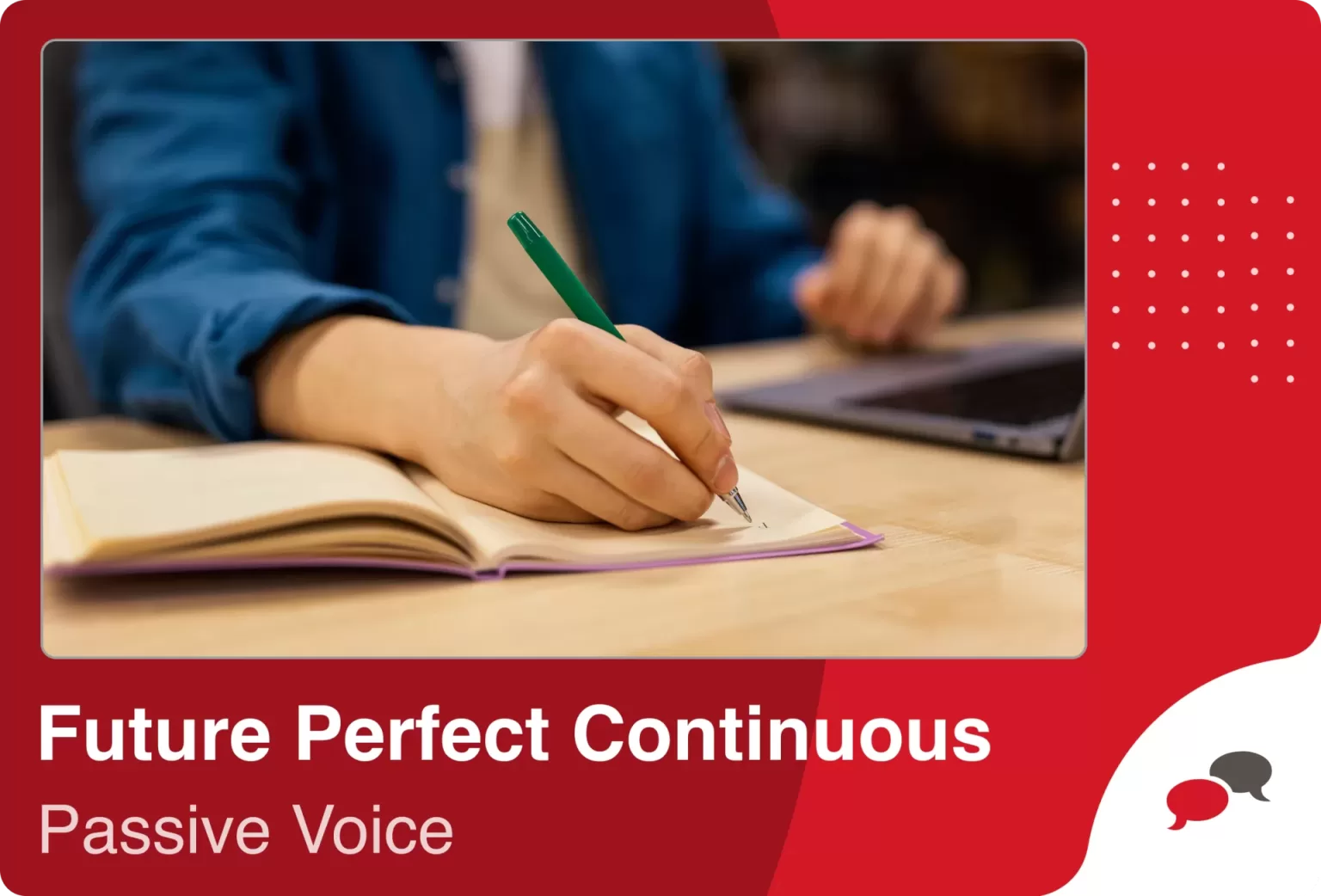The Future Continuous Passive Voice is used to describe an ongoing action that will be happening in the future and is being done to the subject, meaning the subject is the receiver, not the doer of the action. The Future Continuous Passive Voice is not used very often compared to its active voice counterpart. However, it is still helpful to learn how to construct a sentence in the Future Continuous Passive voice. This article is prepared to help you learn all about the Future Continuous Passive voice.
How to Make Future Continuous Passive Sentences
The future continuous passive voice emphasizes the ongoing action that will be done to the subject in the future, rather than focusing on the doer of the action.
Structure: Subject + will be + being + past participle (verb in -ed form or 3rd form)
When forming a sentence in Future Continuous Passive Voice, keep these points in mind:
Identify the subject of the sentence. The subject is the recipient of the action and will be followed by the verb “will be.”
Determine the verb that represents the ongoing action. Convert the verb into its present participle form (-ing form).
Add the auxiliary verb “being” after “will be.”
Use the past participle form of the main verb after “being.” If the main verb is regular, add “-ed” to the base form of the verb. If it is irregular, use the third form of the verb.
Put the sentence together using the identified subject, “will be,” “being,” and the past participle form of the verb.
We can form different types of sentences (positive, negative, interrogative) in Future Continuous Passive Voice. Let’s take a look at how to form these sentences.
1. Positive Sentences:
To form a positive sentence in Future Continuous Passive Voice, we use the formula of subject + will be + being + past participle (verb in -ed form or 3rd form).
Active Voice: They will be building the new hotel next year.
Passive Voice: The new hotel will be being built next year.
2. Negative Sentences:
To form a negative sentence in Future Continuous Passive Voice, we use the formula of subject + will + not + be + being + past participle (verb in -ed form or 3rd form).
Active Voice: They will not be building the new hotel next year.
Passive Voice: The new hotel will not be being built next year.
3. Interrogative Sentences: To form a positive sentence in Future Continuous Passive Voice, we use the formula of will + subject + be + being + past participle (verb in -ed form or 3rd form).
Active Voice: Will they be building the new hotel next year?
Passive Voice: Will the new hotel be being built next year?
Note: The contraction “won’t” instead of “will not” can be used for simplicity and informality in both negative and interrogative sentences.
Positive Future Continuous Passive Voice
As stated above, to form a positive sentence in Future Continuous Passive Voice, we use the formula of subject + will be + being + past participle (verb in -ed form or 3rd form). Here is a table and some examples to help you better understand.
| Subject | Auxiliary Verb (will be) | Auxiliary Verb (be) | Verb |
|---|---|---|---|
| I | will be | being | V3 |
| You | |||
| He | |||
| She | |||
| It | |||
| We | |||
| They |
Positive Future Continuous Passive Voice Examples
Here are 5 positive future continuous passive sentence examples.
Active: They will be reviewing the students with scholarships over the next month. / Passive: The students with scholarships will be being reviewed over the next month.
Active: We will be filming the TV series in Paris and Rome over the course of a year. / Passive: The TV series will be being filmed in Paris and Rome over the course of a year.
Active: The professor will be reviewing your report this time tomorrow. / Passive: Your report will be being reviewed by the professor this time tomorrow.
Active: Renowned academics will be curating the new poetry book next month. / Passive: The new poetry book will be being curated by renowned academics next month.
Active: They will be compensating us for our losses when we win the case. / Passive: We will be being compensated for our losses when we win the case.
Negative Future Continuous Passive Voice
As stated above, to form a positive sentence in Future Continuous Passive Voice, we use the formula of subject + will + not + be + being + past participle (verb in -ed form or 3rd form). Here is a table and some examples to help you better understand.
| Subject | Modal Verb (will) | Negative Adverb | Auxiliary Verb (be) | Auxiliary Verb (be) | Verb |
|---|---|---|---|---|---|
| I | will | not | be | being | V3 |
| You | |||||
| He | |||||
| She | |||||
| It | |||||
| We | |||||
| They |
Negative Future Continuous Passive Voice Examples
Here are 5 negative future continuous passive sentence examples.
Active: We will not be selling these books anymore next week. / Passive: These books will not be being sold anymore by next week.
Active: I won’t clean my apartment this week. / Passive: My apartment will not be being cleaned this weekend.
Active: The students won’t be visiting the zoo tomorrow. / Passive: The zoo will not be being visited by the students tomorrow.
Active: They will not be selling the movie tickets online this time. / Passive: The movie tickets will not be being sold online this time.
Active: I won’t be installing the antivirus program tonight. / Passive: The antivirus program will not be being installed tonight.
Interrogative Future Continuous Passive Voice
As stated above, to form an interrogative sentence in Future Continuous Passive Voice, we use the formula of will + subject + be + being + past participle (verb in -ed form or 3rd form) and will + subject + not + be + being + past participle (verb in -ed form or 3rd form). Here are some tables and examples to help you better understand.
Positive Questions:
| Modal Verb | Subject | Auxiliary Verb (be) | Auxiliary Verb (be) | Verb |
|---|---|---|---|---|
| Will | I | be | being | V3 |
| You | ||||
| He | ||||
| She | ||||
| It | ||||
| We | ||||
| They |
Negative Questions:
| Modal Verb | Subject | Negative Adverb | Auxiliary Verb (be) | Auxiliary Verb (be) | Verb |
|---|---|---|---|---|---|
| Will | I | not | be | being | V3 |
| You | |||||
| He | |||||
| She | |||||
| It | |||||
| We | |||||
| They |
Positive Interrogative Future Continuous Passive Voice Examples
Here are 5 positive interrogative future continuous passive sentence examples.
Will the concert be being performed by the famous band tomorrow?
Will the documents be being reviewed by the committee next week?
Will the house be being renovated by the construction crew?
Will the cake be being baked by the pastry chef for the party?
Will the movie be being filmed in the city?
Negative Interrogative Future Continuous Passive Voice Examples
Here are 5 negative interrogative future continuous passive sentence examples.
Will my documents not be being approved in two days?
Will the packages not be being delivered by the old delivery company anymore?
Will our problems not be being resolved this quickly when you move away?
Won’t the event be being cancelled after your announcement?
Will the decisions not be being made by the board of directors anymore?
What was he watching at the theater?
Where were we walking in the forest?
Who were you talking to?
What were the children jumping with?
Why wasn’t the dog eating food?
Where were the birds singing loudly?
Why wasn’t the moon shining?
Short Answer Questions in Future Continuous Passive Voice
ATo give short answers to questions instead of full sentence answers, we can use the formula of Yes/No + subject + will / will not. Here are some tables and examples to help you better understand.
Positive Answers:
| Confirmation Word | Subject | Modal Verb | Auxiliary Verb (be) |
|---|---|---|---|
| Yes | I | will | be |
| You | |||
| He | |||
| She | |||
| It | |||
| We | |||
| They |
Will the documents be being reviewed by the committee next week? Yes, they will be.
Will the house be being renovated by the construction crew? Yes, it will be.
Negative Answers:
| Denial Word | Subject | Modal Verb | Negative Adverb | Auxiliary Verb (be) |
|---|---|---|---|---|
| No, | I | will | not | be |
| You | ||||
| He | ||||
| She | ||||
| It | ||||
| We | ||||
| They |
Will the packages not be being delivered anymore? No, they won’t be.
Will the movie be being filmed in the city? No, it will not be.
Wh- Questions in Future Continuous Passive Voice
When we want to learn more specific information, we can include question words in our questions. These question words include “who, what, when, where etc.” To ask wh- questions in Future Continuous Passive Voice, we use the formula of question word + will + subject + be + being + past participle (verb in -ed form or 3rd form). Here is a table to help you better understand.
| Question Word | Subject | Modal Verb | Auxiliary Verb (be) | Auxiliary Verb (be) | Verb |
|---|---|---|---|---|---|
| Who, what, when, where etc. | I | will | be | being | V3 |
| You | |||||
| He | |||||
| She | |||||
| It | |||||
| We | |||||
| They |
Who will be being interviewed for the magazine today?
What will be being discussed at the annual meeting tomorrow?
When will you be being called by your boss?
Where will your wedding be being held next month?
Future Continuous Passive Voice
What is the Future Continuous Tense Passive Voice?
The Future Continuous Tense Passive Voice is the passive form of the Future Continuous Tense. It is used to put emphasis on the duration and the action.
Is the Future Continuous Tense Passive Voice used often?
No, the Future Continuous Tense Passive Voice is not used often.
What is the Future Continuous Tense Passive Voice formula?
The Future Continuous Tense Passive Voice formula is subject + will be + being + past participle (verb in -ed form or 3rd form).
What are some Future Continuous Tense Passive Voice examples?
The repairs will be being conducted by the company with the best reviews.
The project will not be being delayed this time.
Would you like to put what you have learned into practice? You can access everything you need to learn English on a single platform! With 25-minute one-on-one live English lessons, 40-minute group lessons, more than 30,000 interactive videos, vocabulary learning tools, AI-supported tutor MiMi, quizzes, and interactive activities, EnglishCentral offers its users a personalized and quality education plan at an affordable price. How about registering for EnglishCentral now and starting to learn English?











